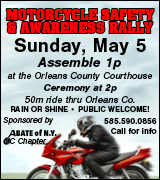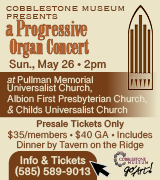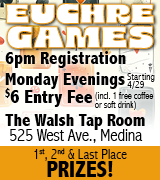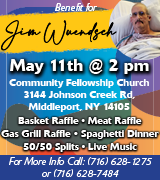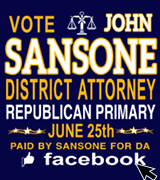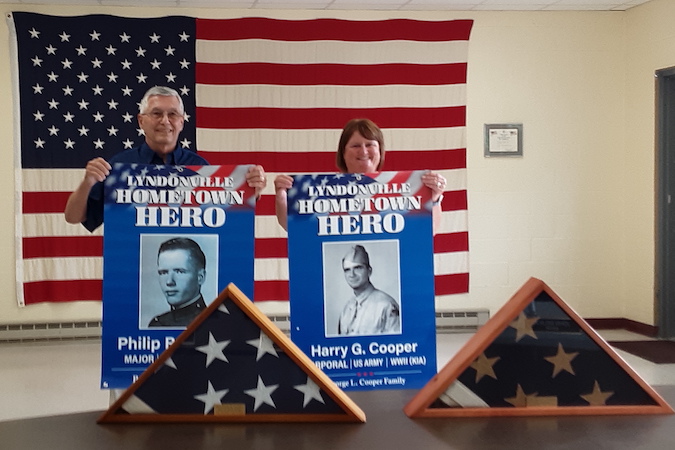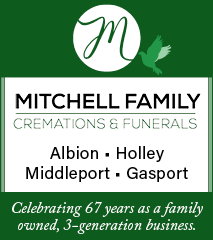2 visit Lyndonville to see Hometown Hero banners of family that served
Memorial flags honoring 2 soldiers from Lyndonville now in display in Village Hall
LYNDONVILLE – The importance of honoring local veterans was made evident Wednesday when the family of two Lyndonville natives, whose banners are among Lyndonville’s Hometown Heroes, came to visit.
Paul Cooper and his wife Linda of Novi, Mich. and Paul’s cousin and husband Lindy Cooper and Ron Biersbach of Hamburg came to Lyndonville to meet with Valerie Wells, who coordinates the Home Town Heroes program in Lyndonville, and Steve Goodrich, commander of the Houseman-Tanner American Legion Post.
Paul brought with him the two flags to donate to the village of Lyndonville, which had been placed on the caskets of his twin brother, Maj. Philip Cooper, and uncle, Cpl. Harry Cooper. Harry was killed in action in September, 1944, when his unit entered Germany and his tank was hit and burned. Philip attended West Point, served in the Army in Vietnam and enjoyed an illustrious career.
Paul wanted his ancestors remembered in the community, he said. The flags, along with all of Harry’s possessions had been stored in Paul’s father’s barn and passed to his brother Claude.
“A year ago, Claude contacted me and asked if I wanted them,” Paul said. “I didn’t want them to end up in somebody’s closet, so I took them.”
Meanwhile, Paul paid for a banner for his uncle Harry, while Phil’s widow, the former Darlene Pahura of Medina, paid for his. The banners hang just south of the village limits across from one of their father’s three farms. It is the farm Harry would have inherited, Paul said.
Wells was instrumental in starting the Hometown Heroes banners in Lyndonville last year. She presented the idea to the Village Board in 2021 and it was decided the funds would run through the Lyndonville Area Foundation.
There are 135 banners displayed this year. Along with the Cooper banners, several of interest include Col. Rick N. Parsons, USAF 1965-1992, USAF Academy Alumni; Ret. Mjr. Gen. Richard D. Kenyon, U.S. Army, Vietnam; and Lt. Col. Ralph E. Smith, U.S. Army, 1965-1995.
The casket flags have an interesting story, in that Harry’s has gold stars, while Philip’s has white. Paul explained when casualties rose during the early months of World War II, the supply of casket flags dropped, so the government requisitioned a small French garment factory to make flags. They had heard of the Gold Star Mothers and assumed the stars should be gold if they were to be used on a veteran’s casket. It is estimated 500 of them were manufactured before they realized their error. It is thought all the gold star flags were used on caskets of United States soldiers killed in Germany.
Paul wonders if the casket of Sgt. Newell Breed, a graduate of Lyndonville Central School’s class of 1943, also had a gold star flag. Breed was killed in Germany March 18, 1945 and was returned to the United States aboard the US Oglethorpe, along with Harry’s remains. Harry was a 1933 graduate of Lyndonville Central School.
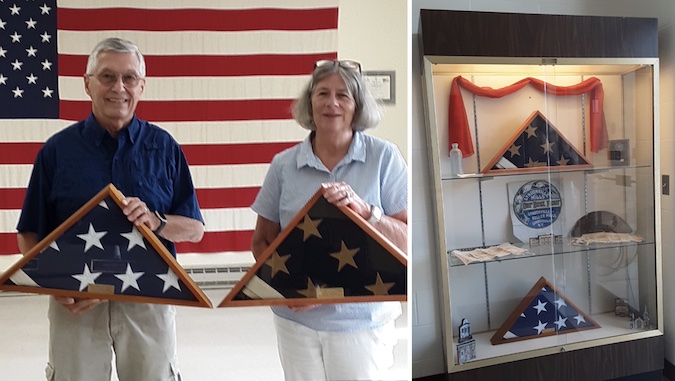
(Left) Paul Cooper of Novi, Mich. and his cousin Lindy Cooper Biersbach of Hamburg hold memorial flags which were placed on the caskets of their relatives, Maj. Philip Cooper, who served with the Army in Vietnam and died Jan. 5, 2008 from cancer, and his uncle Cpl. Harry Cooper, who was killed in action Sept. 18, 1943 in Germany. Cooper brought the flags to the village of Lyndonville on Wednesday. (Right) The memorial flags placed on the graves of Lyndonville natives Cpl. Harry Cooper and Maj. Philip Cooper are on display in a case in the Lyndonville Village Hall.
After being killed, Harry was initially buried in a shallow grave near Bitburg, Germany, where it was pointed out to U.S. troops working there in the spring of 1945. His remains were disinterred and reburied in a military cemetery in Hamm, Luxembourg, where they remained until his parents requested they be returned to Lyndonville. His grave is in Hartland Cemetery, Gasport.
The Cooper family have long been pillars of the Lyndonville community. Philip and Paul had an older brother Claude, who all worked on the family’s fruit farm. Philip married the former Darlene Pahura of Medina in the chapel at West Point.
He had graduated from Clarkson College of Technology in Potsdam, majoring in physics, when he was urged by the local U.S. Representative to apply at West Point. He reported to Ranger School at Fort Benning, where he excelled, graduating number one in his class. His first assignment was with the 2nd Squadron, 17th Cavalry, 101st Airborne Division at Fort Campbell, Ky. He was scheduled to attend flight school, but because of his outstanding record in Ranger School, the Army assigned him to Vietnam.
Operating with the 4th Infantry Division, Philip led long range foot patrols deep into enemy territory, usually out of range of friendly artillery and often out of radio contact with friendly forces. Later, in the 1st Battalion, 10th Cavalry, he experienced intense combat. On one occasion, his personnel carrier sunk in a rice paddy and his crew died, but his strong survival skills enabled him to pull three other soldiers to safety. For another action taking a hill, Phil received a Bronze Star for Valor.
After Vietnam, Philip completed his flight training earning both fixed wing and helicopter ratings.
In 1972, he completed his master’s degree in industrial engineering with a major in computer science at Arizona State University. Next was an assignment to an Army think tank in Bethesda, Md., where he developed a new computer capability to deploy troops where they were needed. This earned him decoration for meritorious service.
In 1976, he was a commandant’s list graduate of the Army Command and General Staff College at Fort Leavenworth. This was followed by three years of teaching math at West Point. He headed the advanced calculus program and earned an MBA from Long Island University. He returned to troop duty in 1979 as executive director of the 1st Battalion, 34th Armor. In his last assignment, Philip coordinated all systems and maintenance activities inside Cheyenne Mountain, Colorado, for NORAD.
Paul also explained one of Philip’s accomplishments was developing the plastic bread wrapper for Union Carbide.
When health problems forced his retirement, Philip moved to Hudson, Fla., where he did doctoral work at the University of Florida, obtained his real estate license, trained income tax preparers and managed his real estate holdings.
Information provided by Paul states, “Impressive as Phil’s accomplishments were, there is no doubt he would have accomplished even more had he not suffered from severe post-traumatic stress syndrome, due to his combat experience.”
Philip died Jan. 5, 2008 from cancer (which Paul explained was due to Agent Orange) and was interred at West Point on June 9, 2008, the 43rd anniversary of his graduation.
















